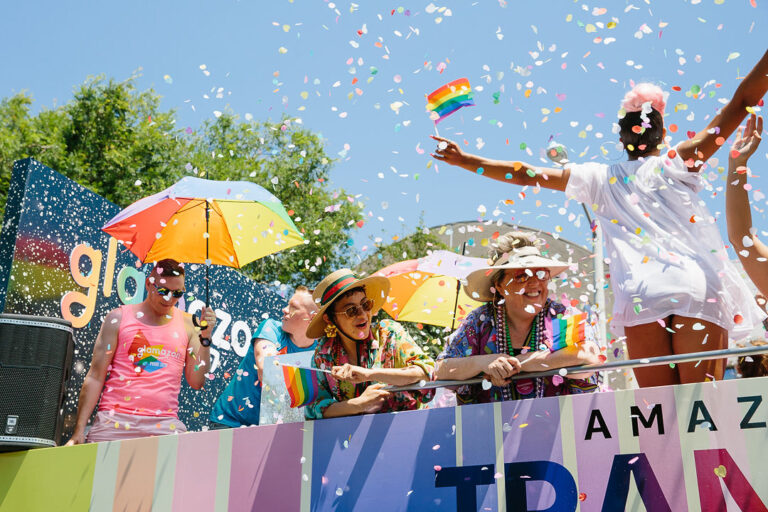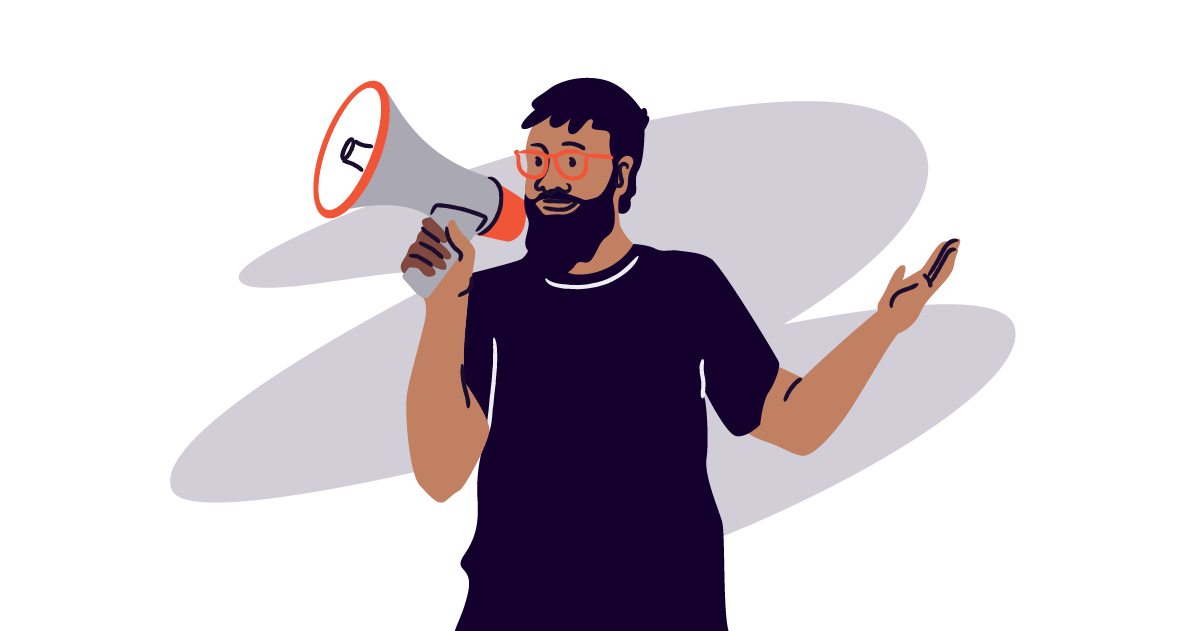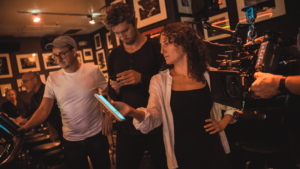February 2023 is LGBTQ+ History Month – an excellent opportunity for community members and allies to come together and learn about LGBTQ+ history, icons, and the fight for equality. Want to host your own event but don’t know where to start? This guide includes 30 LGBTQ+ event ideas to inspire you and engage your local community.
Table of contents
Why do we celebrate LGBTQ+ History Month?
30 LGBTQ+ History Month event ideas
Behind the Lens: LGBTQ+ History Month event ideas
9 Ways to celebrate LGBTQ+ History Month in the community
Cultural LGBTQ+ History Month ideas
Virtual LGBTQ+ History Month event ideas
Why do we celebrate LGBTQ+ History Month?
LGBTQ+ History Month was founded in 2004 by Schools OUT co-chairs, Paul Patrick and Professor Emeritus Sue Sanders in the UK. It was first celebrated in 2005, establishing a regular calendar of equality and diversity events across many sectors.
As well as ensuring that the education system and other UK institutions are safe spaces for the LGBTQ+ community, the event’s primary goal is to increase the visibility of LGBTQ+ history in society. For this reason, it’s important to honour this month by creating inclusive events outside of schools and engaging the wider community.
What’s the difference between LGBTQ+ History Month and Pride Month?
Pride Month was inspired by the 1969 Stonewall Uprising: a pivotal point in the Gay Liberation Movement in the U.S. Since 1970, LGBTQ+ community members and allies have marched in June as both a celebration of pride and demonstration for equal rights.
LGBTQ+ History Month focuses more on teaching LGBTQ+ history, as well as celebrating the successes of members of the community.
30 LGBTQ+ History Month event ideas
We’ve put together 30 ideas to inspire your next LGBTQ+ History Month event. Scroll down for suggestions that will educate and delight attendees.
Behind the Lens: LGBTQ+ History Month event ideas
This year, the LGBT history month theme is “Behind the Lens”. The idea is to show and celebrate the work LGBTQ+ people have put into television and film behind the scenes, both past and present. It also highlights the difference between depictions of the LGBTQ+ community in media vs. the reality of queer life.
1. Film screening
Choose a film from a director or screenwriter who is part of the LGBTQ+ community and screen it in a park or cinema. From cult classics like “Hedwig and the Angry Inch” to award-winning pieces like “Carol”, there are plenty of choices to cater to the tastes of your specific community.
2. Documentary screening
Look for documentaries focusing on the struggles or successes of the fight for LGBTQ+ rights in the UK and overseas. Recent UK releases like “Tom Daley: Illegal to Be Me” and Louis Theroux’s “Transgender Kids” will engage audiences beyond the specific group they depict. Consider reaching out to local documentarians who are part of the community and work together to screen their latest projects.
3. Plan a gay play
Organise a production of a play by an LGBTQ+ playwright, such as Joe Orton, Oscar Wilde, or Martin Sherman. Work with a cast and crew that are also part of the LGBTQ+ community.
4. Art exhibition
Why not organise an art exhibition for the work of up-and-coming LGBTQ+ artists? Display pieces that engage with LGBTQ+ life and issues.
5. Book club
Choose books that have been depicted on screen so that once you’ve read and discussed the book, you can also screen the film. Find works by LGBTQ+ authors that explore issues the community faces. For example, opt for Becky Albertalli’s novel “Simon vs. the Homo Sapiens Agenda” (adapted into the popular feature film “Love, Simon”) for a teen/young adult audience. For a more mature group, how about “A Single Man” by Christopher Isherwood, adapted by Tom Ford into a 2009 film starring Colin Firth? You can also easily pivot this type of event into a virtual experience for attendees who aren’t local.
6. Speaker sessions
Reach out to members of the LGBTQ+ community who are part of the film industry to speak about their experiences. For example, the official LGBT+ History Month UK organisation is hosting the event LGBT+ Filmmakers Showcase: Tales of Inter- and Intra-actions. Creators will screen a collection of films by British LGBTQ+ filmmakers, who will then participate in a post-screening filmmaker’s speaker session to discuss what queer living looks like to them.
7. Alternative film festival
Celebrate LGBTQ+ filmmakers with a film festival that exclusively screens films made by members of the community. A festival like this can also include lectures or Q&A sessions with members of the LGBTQ+ community and the film industry. Take inspiration from events such as the BFI Flare festival or the CineQ Queer Film Festival in Birmingham.
9 Ways to celebrate LGBTQ+ History Month in the community
Since LGBTQ+ History Month is about spreading awareness and knowledge of LGBTQ+ history, use panel discussions and workshops to entertain and educate attendees. Celebrate and embrace LGBTQ+ history within the community with the following ideas.
1. LGBTQ+ quiz
Lighthearted and fun, or serious and educational? For children or adults? Decide how to pitch your quiz and who your target audience will be. Consider the suitability of your venue, and don’t forget prizes for those with the best LGBTQ+ history knowledge.
2. A breakfast event
A sit-down breakfast or brunch with a speaker is an informal way to connect with someone influential in the community. Donate a portion of ticket sales to a nonprofit organisation that supports LGBTQ+ issues, such as LGBT Health and Wellbeing.
3. Board game social
A social event that centres around playing board games and mingling with new people is a fun and casual way to bring the community together. Take inspiration from the Cambridgeshire Libraries, which has organised LGBTQ+ Board Games Social nights at Cambridge Central Library.
4. Friendship walk
Walks help introverts or socially anxious people to connect. Wolverhampton LGBT+ believes in the simplicity of walking events. “Stride with Pride is our long-running walking group that has proved to be very popular despite really just being as simple as an organised group walk around the park!” says organiser Riley Milligan. “The group is focused on inclusivity, and we strive to create a group that anyone is able to get involved with, regardless of their physical ability.”
5. Lunch and learn event
Including a meal in an educational event adds to the experience. These types of events are common in corporate environments, where the draw of a free lunch will bring in people, but they’ll stay for the educational experience and to learn something new.
6. Sexual health workshop
Create a safe space to engage with your community on how to protect themselves and their sexual partners with a sexual health workshop – and dispel unfounded fears coming from misinformation or ignorance.
7. Panel discussion
A panel discussion brings multiple speakers together to engage in a conversation about a particular topic or issue. Reach out to local LGBTQ+ community members to speak about their experiences, struggles, and successes. Tip: explore contact pages on organisations’ official websites and browse social media, making use of groups like Facebook Community groups.
8. LGBTQ+ awareness workshop
In many companies and institutions, diversity and inclusion training often happens online. Why not bring it into the office? This will encourage attendees to contribute, improving their chances of retaining the ideas. This training could focus specifically on respecting LGBTQ+ members of the community and creating a safe and inclusive space.
9. Local LGBTQ+ history talks
Work with scholars from local universities to discuss historical themes that could help you come up with more LGBTQ+ history month activities. Organise a walking tour if your city or town has locations rich with LGBTQ+ history. This works well in areas that have experienced struggles with LGBTQ+ acceptance.
Cultural LGBTQ+ History Month ideas
Some audience members are looking for events that allow them to actively engage. Organising workshops is a great way to get experiential learners involved.
1. Craft class
Inclusive craft classes help people learn new skills and connect with others in a safe space. Wolverhampton LGBT+ hosts Crafty Sessions that “aim to create the same sense of community in a more relaxed indoor environment”. According to organiser Riley Milligan, “We work through a variety of different arts and crafts projects, with our most popular being the furniture upcycling sessions in which we spice up old furniture with exciting designs born from the minds of our community members!”
2. Inclusive wedding show
Plan a wedding show that pulls together local businesses and wedding vendors and focuses on inclusive weddings, such as the Gay Wedding Show 2023. If you’ve never organised an event like this before, ensure the businesses and vendors you involve have experience working with LGBTQ+ couples, or are members of the community themselves.
3. Yoga class
Yoga has plenty of benefits. LGBTQ+-friendly yoga classes let people unwind in an inclusive space, meet new people in their community, and promote mental well-being combined with body positivity.
4. Take a look through the archives
Take a cue from St Cecilia’s Hall at The University of Edinburgh and have places like museums or universities open up their LGBTQ+ records to share with the community.
5. Collaborative art show
Encourage artists to submit pieces for a themed collaborative exhibition. Limit the scope to up-and-coming LGBTQ+ artists who haven’t yet had the opportunity to show their work.
6. Fundraising concert
If you’re looking to raise money for an LGBTQ+-related nonprofit or cause, plan a fundraising concert and donate a portion of the proceeds from ticket and merch sales. Pull together LGBTQ+ musical artists to perform.
7. Queer drawing classes
Queer life-drawing classes with models can help empower the community. Work with models who represent different factions of the LGBTQ+ community and different body types to embrace beauty beyond limiting societal standards.
Virtual LGBTQ+ History Month event ideas
The LGBTQ+ community is global, so livestreaming events will allow you to reach a much broader audience while simultaneously creating safe spaces for attendees to talk about their experiences.
1. Remote cabaret
A virtual cabaret where professional or amateur singers show off their skills in celebration of LGBTQ+ History month is a lively way to celebrate. Have a “virtual tip jar” allowing attendees to support the performers.
2. Queer history lessons
Ever considered the ground you stand on as a source of inspiration for your next event? Work with local experts or scholars to organise a lecture series covering different topics of LGBTQ+ history.
3. LGBTQ+ songwriting workshop
Virtual workshops allow people far apart to connect and learn new things. Leeds LGBT+ Community Consortium organised an LGBTQ+ songwriting workshop with several sessions. Each one focused on a different LGBTQ+-identifying musical artist and their impact on the community and the music industry.
4. Activist panel
An activist panel is an exciting way to inspire people to work toward change and spread awareness about particular issues. Your event could work like the conference held by the Northern Hub for Veterans and Military Families Research at Northumbria University, in partnership with Fighting With Pride. The Research with the UK LGBT+ Veteran Community Conference will bring together academics, the health and social care sector, local government, charities, the LGBTQ+ community, and veterans. It will focus on the past, present, and future of LGBTQ+ veterans and their experiences during and after military service.
5. Allyship workshop
Consider a virtual event focused on educating allies or potential allies of the LGBTQ+ community. Teach people how to be accepting of the community and how to support further efforts for equality and representation.
6. Online well-being space
Offer adults or young people a safe space to explore mental health topics with a virtual well-being space. Attendees can discuss issues or obstacles they currently face as members of the LGBTQ+ community. Invite a mental health expert who specialises in working with LGBTQ+ youth to moderate the discussion, like Rainbow Mind does with its Rainbow Room event.
7. Explore the future
Take a look at the past to explore the future of LGBTQ+ education. Organise an event for LGBTQ+ youth and adults that teaches important historical information while also looking toward the community’s future.
Ready to celebrate and educate?
Hopefully, our suggestions have got your creative juices flowing, and you’re ready to jump into planning your LGBTQ+ History Month event. Once you’re ready to begin event promotion, start selling tickets with Eventbrite.






